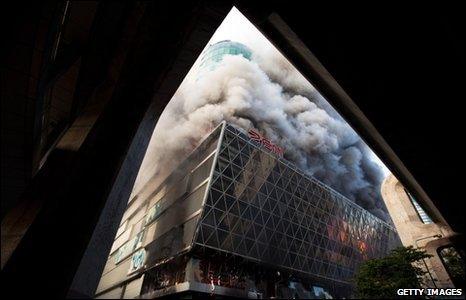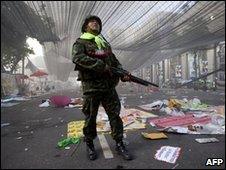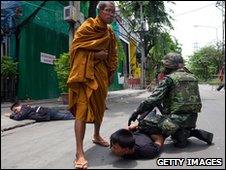Clashes, fires and fears for future in Bangkok
- Published

Fires were started in landmark Bangkok buildings, including the huge Central World Plaza
It was the ominous sound of helicopters that heralded the start of the military move on the protest camp that many had expected for weeks.
Troops used armoured cars to break down barricades that had stood for weeks and moved into the sprawling camp.
Six people died in the operation - a tragedy, but a toll far lower than many would have feared for such an operation.
The larger cost is still being counted however.
The burning of shopping centres, the stock exchange, the headquarters of a television channel and several government buildings has left a bad taste after a protest that had been largely peaceful and disciplined.
For one of my colleagues, the toughest moments came as she followed troops as they approached the protest camp from the south.
The soldiers were moving in a highly disciplined and organised way, moving forward 50m, stopping, checking ahead, awaiting orders amid volleys of gunfire, then moving forward again.
They were checking debris left behind by fleeing protesters, and found two dead bodies.
"We got a message from DC [camera man Darren Conway] telling us he could see through his long-range lens that gunmen were up on the Ratchadamri Skytrain station pointing down at the troops and at us, so we moved back.
"Then there was a huge boom and I saw water fly up from one of the ponds in Lumphini Park," Rachel Harvey said.
Jackfruit seller
After red-shirt leaders called off their protest, people were seen looting the remains of the red-shirt camp, taking away fans and bedding left behind in the mad dash for safety.

The main protest area, once full of protesters, is now empty
Even as some protesters cheered on the destruction, others waited patiently, some handcuffed, for a long convoy of police vehicles to take them away.
Another colleague told me he was awed by how patiently these people, monks among them, waited to be reunited with their belongings.
As the police sifted through the mess, there was no animosity among the crowd, Chris Hogg said.
There were also scenes of pragmatism as the unrest ebbed and flowed.
On Tuesday, a jackfruit seller had cheerfully appeared on television in her sunhat.
On Wednesday, with troops on the street and the military operation underway, she rolled up her fruit trolley as usual, but this time wearing a black helmet.
Within a couple of hours of the red-shirt leaders' surrender she had gone back to her sunhat, providing a fitting barometer of how tension peaked during the day.
'Hangover'

Soldiers detained protesters but the operation was less bloody than feared
But the burning to near-total destruction of the Central World Mall after the main protest leaders had surrendered will hurt many Bangkok residents.
Formerly known as the World Trade Center, the huge mall has provided the favourite shops and restaurants for middle class city dwellers.
As night fell, piles of iron tailings smouldered from burned-out tyres, as new fires were set across the city.
The government has two more days of public holidays to try to calm the outbreaks both in Bangkok and the north of the country.
Schools are supposed to reopen next week - one week late. But recovery from this political trauma will take much longer.
The streets might clear soon, but the deep divisions, the long battle of wills, the vicious aftermath of the clearance operations - particularly the fires - will leave a bitter aftertaste.
"I think the Thais tomorrow are going to wake up with a very bad hangover," said one of the journalists who had covered the long build-up and dramatic end to a protest that had tried - and failed - to depose the government.